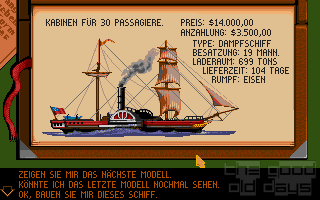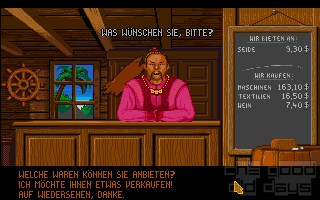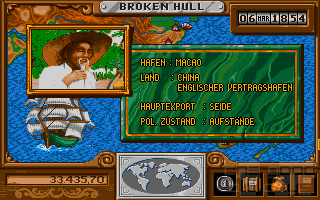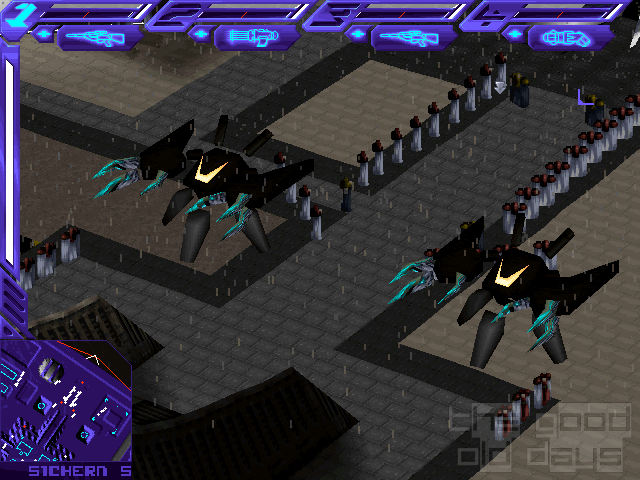The Patrician, covering the Hanseatic League, had just been released out of inland Germany when just few months later, things turned even more absurd when 1869, a game about worldwide maritime trade in the age of imperialism, arrived from provincial Austria. Which you wouldn't have guessed if there weren't these small in-jokes (check the description of Trieste), the game being polished through and through. Hard to believe this was the work of newcomers to the business. Though then, this was of course still the age of the bedroom coder.

You send your ships around the globe on a nicely drawn world map. Or rather, at first, it is just a washed-up little barge. You transport goods from port to port, hoping to sell them for a profit elsewhere. Though the naive baseline to just look for a higher selling than buying price is obviously not sufficient, as running costs for crew, taxes, repairs etc. have to be considered. As common since those times, there is no deeper purpose to any of this. In purely capitalist fashion the player who earns most money within the pre-set timeframe (5 - 25 years) wins.
The choice of historical period is rather smart. True worldwide trade was only just emerging at the time. It was an age of large-scale commercially motivated wars - the American civil war, the opium wars - but also of industrial revolution, like the eponymous opening of the Suez Canal or the gradual triumph of steam ships. The game simulates this highly volatile world meticulously through a set of predefined events.

Attractive graphics and menus in multiple choice adventure style make for an inviting first impression. Only the controls can become a bit cumbersome in place. Sending out a ship, for example, requires an unintuitive sequence of left and right mouse clicks, and keeping an overview over the balance sheets with all their various options isn't exactly trivial, either. At least it works well enough once routine has set in.
The very high difficulty level, on the other hand, is much harder to stomach on the long run. Running a profitable business is unfortunately not just a matter of intensive study, planning and talent. On top, you are expected to perform quite some busywork, diligently noting down price sheets of all ports. Though even after that, you will at some point realize that profit margin on regular trade routes are simply too small. Under otherwise perfect conditions, they are just enough to cover running costs.

The only thing really giving a major injection to the company account is taking on special missions or reacting to global events. Shipping weapons to crisis regions yields high profits if you can sneak past the warships. Tea deliveries to London are almost as profitable, but (particularly before existence of the Suez Canal) the distance from India is large and the goods are highly perishable. Everything promising real profits is also highly risky.
Which makes a lot of sense, but in-game implementation is hardly adequate. War blockades are completely out of the player's control - they are a pure game of chance. Wind and current maps to optimize travel times have been packed into the box at least. On top of that, different quality crews can be hired, the captains can be given orders how to treat the sailors. Looks like sufficient room to influence travel time, right? In theory, yes. It's just that the effect of such settings isn't comprehensible, which makes the over-abundance of detailed options and combinations of each even more absurd.

On top of this, as volatile the world state may appear to be at first, it is really just statically plannable, fixed events. A real simulation of the world is not part of the game. Writing down all prices asked and paid per port is only useful, because they are static throughout. You may think delivering large amounts of the same wares should decrease their price over time in this port, but no, the only effect is that trade will be temporarily stopped completely. Just to be taken up again at the old price few days later.
A high difficulty level is not by itself a cause for complaint. in case of 1869, however, it is all for the wrong reasons. The basic world settings are too fierce and random bad luck strikes too severely. The breadth of actually relevant, strategic planning decisions made by the player is – hidden behind a smoke screen – paper thin. 1869 is a game which offers a lot of beautiful tapestry, but it fails at its own gameplay-relevant core.


Comments (2) [Post comment]